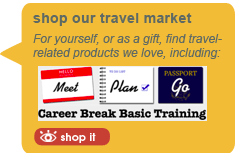The dreaded resume gap. It’s enough to make any wannabe career breaker take a pause. But, the landscape has drastically changed for workers. And, career breaks are no longer an automatic path to closed doors once you get back. Your resume and past experience is still relevant and valued. Furthermore, your career break could be a key point of differentiation in your favor.
But, that doesn’t mean you don’t have to sell yourself properly and smartly to your prospective employer or recruiter on your return. I’ve asked an experienced career and recruitment pro, Ginnie Clarke, to answer some questions about the best way to handle your job search and how you can leverage your travel experience to land a great job once you return.
1. To start off, I want to get your perspective on how you’ve seen the landscape change on the acceptance of career breaks and sabbaticals from the employers’ point of view.
When I started in executive search nearly 14 years ago, there was a stigma carried by people who were out of work or had chosen to take a break from work.
2. What has driven this change and increased acceptance
At least 2 factors have helped eliminate that stigma since then. The robustness of the dot.com economy allowed some people to check out of the traditional workforce with wealth even at a young age. The more recent recession caused layoffs of talented people being forced to take a break. We’ve become accustomed to people not working – at least not in traditional jobs.
3. How should you talk about your career break to a recruiter? I’ve heard they tend to have less patience with people returning from a career break.
I think it depends on the recruiter. Be prepared to describe what brought about the break and why you know you are ready to return. Ideally you can talk about some of the relevant lessons learned from the break that you are bringing back into your work. The main thing is not to leave questions about commitment, work ethic, state of mind, etc.
4. How about to a prospective employer? Are there any differences?
Employers might be more tolerant than a recruiter. The recruiter is seeking qualified candidates with as few questions, blemishes or quirks as possible.
5. What are the types of things to play up in talking about your career break or describing it on your resume?
You want to play up purpose, service or personal enhancement versus an extravagant boondoggle. Did you learn a language, build homes, write a book or determine the meaning of life? Also demonstrate that you are current on issues, technology, etc, and that you were not so out of touch that you missed something or lost your competitive edge. You want to be perceived as more compelling and interesting than when you left.
6. Would you say that there are any definite no-nos?
Don’t dwell on the break, don’t apologize for it either; strike a balance. An interviewer who has never left the country might be jealous and judgmental whereas a well-traveled person might want to talk more about some of the details of your break.
7. What reservations or concerns will prospective employers and recruiters tend to have about people coming off a career break?
Employers and recruiters want to make sure you are serious about re-entry and won’t take off again. Hopefully your work record before the break demonstrates your stability and commitment.
8. What are some aspects of candidates that have taken career breaks that would be attractive to potential employers?
Some employers and recruiters will find your curiosity and willingness to take risks attractive. You are a maverick and in some contexts that is appealing. Your exposure to other cultures and language facility can be attractive to a company with global operations.
9. What are some steps that career breakers can take before they leave to make it easier for them when they return to find a job?
Do some networking in professional associations or circles where you might be looking when you return to put the word out about what you are doing and why. Unexplained absences raise questions. Even send periodic notes to a few associates while away about what you are learning. Use social media (FB, LinkedIn) as a tasteful, educational scrapbook to share with friends and associates.
10. How have you seen career breaks benefit people and their careers over the longer term?
I’ve seen people return with a different perspective about work and their purpose in life.
11. Finally, what advice do you have for someone thinking about a taking a career break?
Think beyond the trip about what skills, lessons or messages you want to bring back to incorporate into your work life. Be aware of the timing of your departure relative to the state of the economy and be conservative about how long landing a new job will take when you get back; plan for it. Go have a great time and come back rested and refreshed!
Ginny Clarke is an expert in talent and career management and executive coaching. Her firm, Talent Optimization Partners, LLC, is a talent management consulting firm. Prior to forming her own firm in 2009, Ginny was a partner at Spencer Stuart, the global executive search firm. She is the author of the forthcoming book titled “Career Mapping: Charting Your Course in the New World of Work” which has an April 2011 release date. See her web site and blogs at www.mycareermapping.com.
Tags: career break advice





[...] This post was mentioned on Twitter by Sherry Ott, Sarah Palmer. Sarah Palmer said: Nice! RT @CareerBrkSecret How to Deal w/ Your Resume Gap After a #CareerBreak. Interview w/Career Expert @GinnyClarke http://budurl.com/5puu [...]
Great tips!! Thanks for sharing!
Angela (SabbaticalScapes) recently posted..Moving Forward
I know that this is a very important topic for anyone who takes a gap year and career break, I just really wish the entire hiring circle would get over the fact that people take gap breaks all together. The notion that you have to be continually working or else something is wrong with you is a horrible thought process to have. Skills and experiences don’t fade over time, especially if it is in the context of a career.
Jeremy recently posted..Where You Should Be! – Chamonix- France